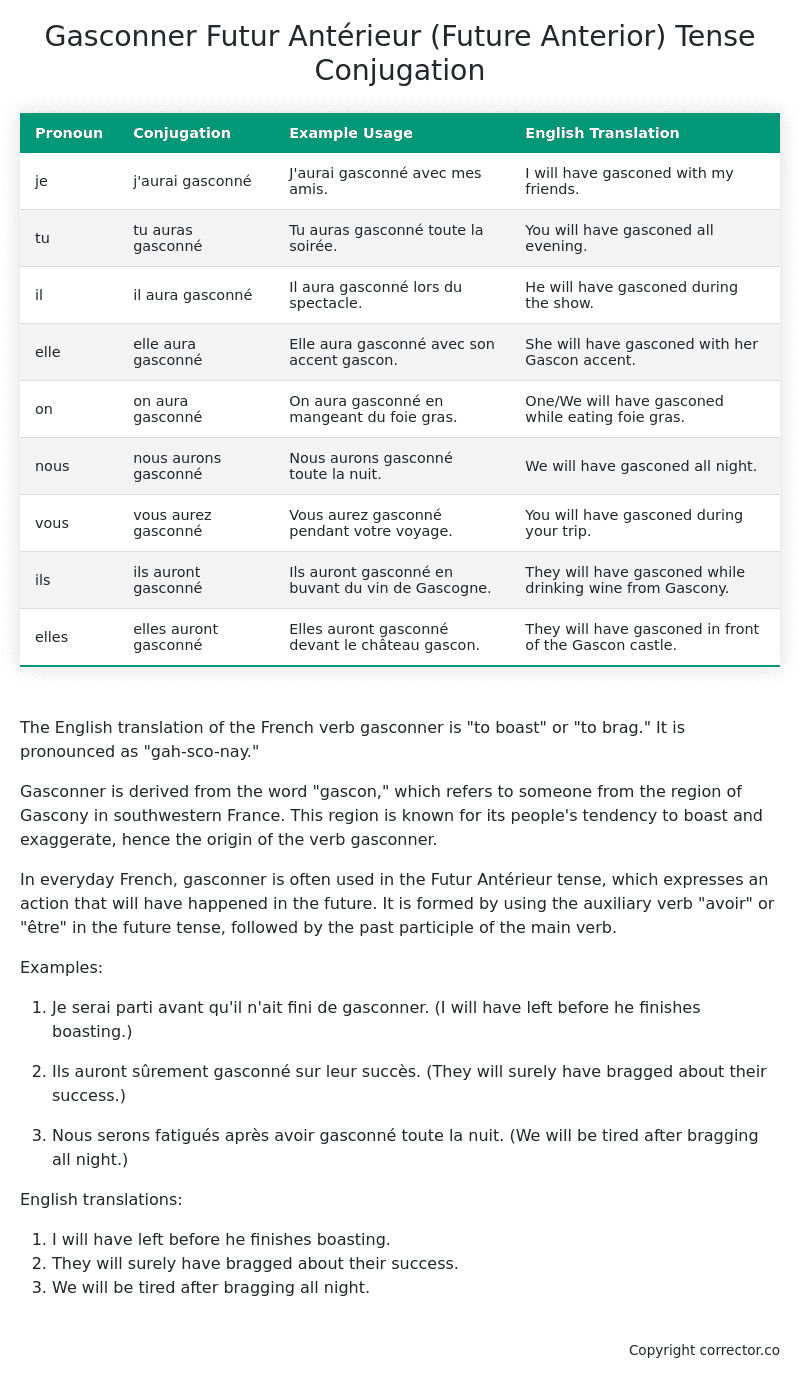Futur Antérieur (Future Anterior) Tense Conjugation of the French Verb gasconner
Introduction to the verb gasconner
The English translation of the French verb gasconner is “to boast” or “to brag.” It is pronounced as “gah-sco-nay.”
Gasconner is derived from the word “gascon,” which refers to someone from the region of Gascony in southwestern France. This region is known for its people’s tendency to boast and exaggerate, hence the origin of the verb gasconner.
In everyday French, gasconner is often used in the Futur Antérieur tense, which expresses an action that will have happened in the future. It is formed by using the auxiliary verb “avoir” or “être” in the future tense, followed by the past participle of the main verb.
Examples:
-
Je serai parti avant qu’il n’ait fini de gasconner. (I will have left before he finishes boasting.)
-
Ils auront sûrement gasconné sur leur succès. (They will surely have bragged about their success.)
-
Nous serons fatigués après avoir gasconné toute la nuit. (We will be tired after bragging all night.)
English translations:
- I will have left before he finishes boasting.
- They will surely have bragged about their success.
- We will be tired after bragging all night.
Table of the Futur Antérieur (Future Anterior) Tense Conjugation of gasconner
| Pronoun | Conjugation | Example Usage | English Translation |
|---|---|---|---|
| je | j’aurai gasconné | J’aurai gasconné avec mes amis. | I will have gasconed with my friends. |
| tu | tu auras gasconné | Tu auras gasconné toute la soirée. | You will have gasconed all evening. |
| il | il aura gasconné | Il aura gasconné lors du spectacle. | He will have gasconed during the show. |
| elle | elle aura gasconné | Elle aura gasconné avec son accent gascon. | She will have gasconed with her Gascon accent. |
| on | on aura gasconné | On aura gasconné en mangeant du foie gras. | One/We will have gasconed while eating foie gras. |
| nous | nous aurons gasconné | Nous aurons gasconné toute la nuit. | We will have gasconed all night. |
| vous | vous aurez gasconné | Vous aurez gasconné pendant votre voyage. | You will have gasconed during your trip. |
| ils | ils auront gasconné | Ils auront gasconné en buvant du vin de Gascogne. | They will have gasconed while drinking wine from Gascony. |
| elles | elles auront gasconné | Elles auront gasconné devant le château gascon. | They will have gasconed in front of the Gascon castle. |
Other Conjugations for Gasconner.
Le Present (Present Tense) Conjugation of the French Verb gasconner
Imparfait (Imperfect) Tense Conjugation of the French Verb gasconner
Passé Simple (Simple Past) Tense Conjugation of the French Verb gasconner
Passé Composé (Present Perfect) Tense Conjugation of the French Verb gasconner
Futur Simple (Simple Future) Tense Conjugation of the French Verb gasconner
Futur Proche (Near Future) Tense Conjugation of the French Verb gasconner
Plus-que-parfait (Pluperfect) Tense Conjugation of the French Verb gasconner
Passé Antérieur (Past Anterior) Tense Conjugation of the French Verb gasconner
Futur Antérieur (Future Anterior) Tense Conjugation of the French Verb gasconner (this article)
Subjonctif Présent (Subjunctive Present) Tense Conjugation of the French Verb gasconner
Subjonctif Passé (Subjunctive Past) Tense Conjugation of the French Verb gasconner
Subjonctif Imparfait (Subjunctive Imperfect) Tense Conjugation of the French Verb gasconner
Subjonctif Plus-que-parfait (Subjunctive Pluperfect) Tense Conjugation of the French Verb gasconner
Conditionnel Présent (Conditional Present) Tense Conjugation of the French Verb gasconner
Conditionnel Passé (Conditional Past) Tense Conjugation of the French Verb gasconner
L’impératif Présent (Imperative Present) Tense Conjugation of the French Verb gasconner
L’infinitif Présent (Infinitive Present) Tense Conjugation of the French Verb gasconner
Struggling with French verbs or the language in general? Why not use our free French Grammar Checker – no registration required!
Get a FREE Download Study Sheet of this Conjugation 🔥
Simply right click the image below, click “save image” and get your free reference for the gasconner Futur Antérieur tense conjugation!

Gasconner – About the French Futur Antérieur (Future Anterior) Tense
Construction
Common Everyday Usage Patterns
Interactions with Other Tenses
For example
Summary
I hope you enjoyed this article on the verb gasconner. Still in a learning mood? Check out another TOTALLY random French verb conjugation!


